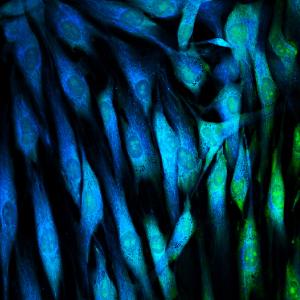Dermatology’s Skin of Color Program Advances Diagnosis & Treatment for Underrepresented Patients

A new dermatology program called Skin of Color focuses on diagnosing and treating skin conditions that disproportionately affect patients with black and brown skin.
Photo: DRB Images
When Daniel Gutierrez, MD, began medical school, he planned to become a primary care physician. Then he learned that the field of dermatology is the least ethnically diverse specialty in all of medicine, and he reconsidered. “My mentors thought I could make a much bigger impact in dermatology, treating underserved patient populations,” recalls Dr. Gutierrez.
Dr. Gutierrez, the son of a migrant worker from Mexico, has long aspired to bring better care to those hit hardest by healthcare disparities. Now an instructor in the Ronald O. Perelman Department of Dermatology, he’s quickly making an impact in his field. Just months after completing his residency at NYU Langone Health last year, Dr. Gutierrez joined forces with NYU Langone dermatologists Nayoung Lee, MD, Prince Adotama, MD, and Anupama Parameswaran, MD, to establish a new initiative focused on diagnosing and treating dermatological conditions that disproportionately affect those with black and brown skin. The program, called Skin of Color, emphasizes medical therapies, clinical research, and educational training of residents.
“It was a great idea that was only missing the motivated clinicians who wanted to implement it,” says Seth J. Orlow, MD, PhD, chair of the Ronald O. Perelman Department of Dermatology.
The four young doctors treat the full spectrum of skin problems, though each has a special interest in a condition impacting patients with pigmented skin. Dr. Gutierrez’s focus is vitiligo, which results in spotty white patches that can be minimized with topical medications and light treatments, known as phototherapy. Dr. Lee, a skin cancer surgeon, is the principal investigator of a study to determine whether laser-assisted drug delivery is effective at eliminating prominent raised scars, called keloids, that predominantly affect Black patients.
Dr. Adotama’s research focuses on healthcare disparities and outcomes in hair disorders; he offers a variety of remedies for treatable hair loss disorders among Black patients. Meanwhile, Dr. Parameswaran has created a clinic for an inflammatory skin disease called hidradenitis suppurativa, which causes painful boils in the armpits and genital area and is more prominent among young Black women. She is studying the effect of three investigational drugs that may prove beneficial in treating the disease, under the direction of principal investigator Kristen Lo Sicco, MD, director of NYU Langone’s Skin and Cancer Unit.
While every NYU Langone dermatologist is more than capable of treating these conditions, Dr. Gutierrez points to two broader benefits of the burgeoning program. First, the team will attune residents and fellows to the nuances of how common skin conditions manifest in patients of color, since images in medical textbooks tend to show how they look only on white skin. For instance, psoriasis, an overgrowth of skin cells that causes itching and scaly flareups, usually appears red or pink on fair-skinned people but is more likely to be violet or dark brown on those with black skin.
Beyond this, the team plans to bring more patients of color to their NYU Langone practices through outreach efforts, as well as word of mouth. All four physicians have skin of color—Dr. Gutierrez is Hispanic, Dr. Adotama is Black, Dr. Lee was born in South Korea, and Dr. Parameswaran is of Indian descent—and believe that their backgrounds will help attract those who may be hesitant to seek out a dermatologist. “When you have cultural concordance, patients have more confidence in your care, and that improves outcomes,” says Dr. Gutierrez.

